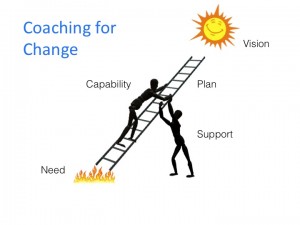In thirty years of working as an Organisational Psychologist, the majority of my work has been helping clients with two similar needs; coping with a change imposed upon them or creating a desired change.
Over this time I have gained some key insights into what is required for successful change.
The first is that it does not matter so much what you as a leader, manager or coach do, what matters is what the person you are trying to influence thinks and feels. We always try to be “client focused” but too often we focus on our own actions not on the impact we have on others.
What is required for change to occur can be simply expressed as:
[Knowledge x Motivation] / Resistance = Change
If we focus on just one element of the “change equation” our efforts will probably be blocked by another element. To succeed you need to address the full range of influences on the person’s thoughts and feelings about the change. Logic and facts alone will not succeed in persuading someone to change, particularly if there is a fear of the process or consequences of change. Negative emotions need to be minimised and positive emotions, such as hope and desire, need to be engaged.
Combining these insights with the change literature, I have developed an integrated model of change that combines elements from sources such as GROW, Kotter’s 8 Stage Process and Armenakis’s 5 Sources of Change Resistance. My clients and I have found it a useful tool to help us in understanding the change process, what we need to know about them and their environment, their own change strengths and blockages, as well as what has to be done for them to achieve their desired change.
There are five elements of the Coaching for Change model:
1. The Need for change
2. Their Vision of the future
3. Their Plan to carry out the change
4. Their Capability to succeed in carrying out their change plan
5. The Support they believe they have from others
To briefly address each area:
1. Need. People need to believe that the current situation is no longer viable and that they need to move away from it. Change agents can raise awareness of the undesirable aspects of the current situation. Kotter refers to this as creating a “burning deck”.
2. Vision. There needs to be a desirable and viable alternative to the current situation. This can be done by creating a vision of a highly valued future life and career, which the person is inherently motivated to pursue.
3. Plan. For this motivation to be transformed into action, a credible plan of action needs to be produced, usually involving goals and action steps. This is similar to the “Way Forward” in the GROW model. The critical factor is that the person believes the plan will be effective in moving them from where they are now towards their desired vision.
4. Capability. The best predictor of someone’s performance is not their actual skill level but, rather, their confidence or belief in their capability to succeed. If people expect to fail, they will not participate. Boosting confidence in regards to succeeding in the change is a vital step.
5. Support. People are too often considered only as individuals, while their social and organisational environment is usually neglected, especially in coaching. If people feel they are supported by their manager, peers and organisation, they are more likely to participate fully in change.
Coaching for Change is a simple, effective and credible model for helping people make the changes they need to achieve the lives and careers they want. It constitutes an advance from earlier models such as GROW whilst remaining simple enough to be easily applied in practice. I have used it in executive coaching, in teaching trainee coaches how to conceptualise the coaching process, and with leaders to help them understand what they need to do to drive change amongst their followers. I would be very happy to discuss Coaching for Change in more depth than is possible in this short outline.

This article was written by a special guest contributor, David Heap. David Heap is an Organisational and Coaching Psychologist working in Sydney, as well as National Convenor of the Coaching Psychology Interest Group within the Australian Psychological Society. He is an associate of Henricks Consulting and also runs his own boutique consulting firm.


